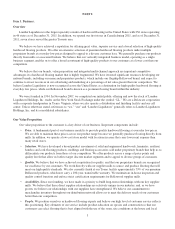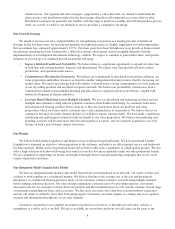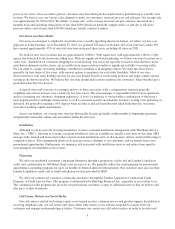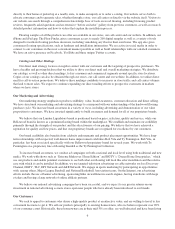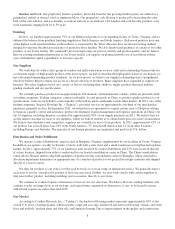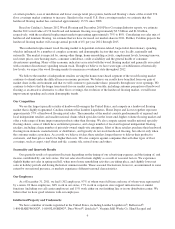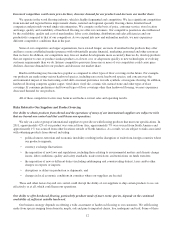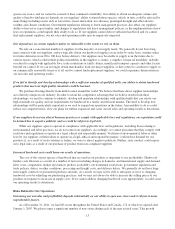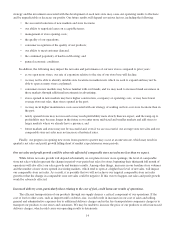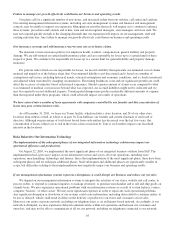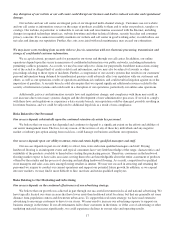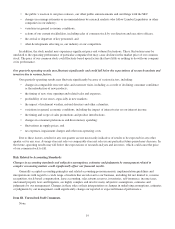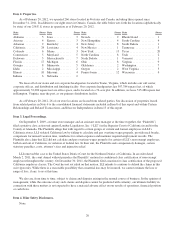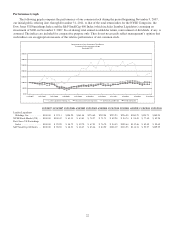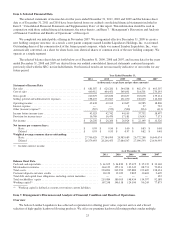Lumber Liquidators 2011 Annual Report Download - page 19
Download and view the complete annual report
Please find page 19 of the 2011 Lumber Liquidators annual report below. You can navigate through the pages in the report by either clicking on the pages listed below, or by using the keyword search tool below to find specific information within the annual report.species are scarce, and we cannot be assured of their continued availability. Our ability to obtain an adequate volume and
quality of hard-to-find species depends on our suppliers’ ability to furnish those species, which, in turn, could be affected by
many things including events such as forest fires, insect infestation, tree diseases, prolonged drought and other adverse
weather and climate conditions. Government regulations relating to forest management practices also affect our suppliers’
ability to harvest or export timber, and changes to regulations and forest management policies, or the implementation of new
laws or regulations, could impede their ability to do so. If our suppliers cannot deliver sufficient hardwood and we cannot
find replacement suppliers, our net sales and operating results may be negatively impacted.
Our dependence on certain suppliers makes us vulnerable to the extent we rely on them.
We rely on a concentrated number of suppliers for the majority of our supply needs. We generally do not have long-
term contracts with our suppliers, and we typically obtain our hardwood supplies on an order-by-order basis, writing orders
for future deliveries from 90 to 180 days before delivery. Our suppliers may be unable to supply us in the future due to
various factors, which could include political instability in the supplier’s country, a supplier’s financial instability, inability
or refusal to comply with applicable laws, trade restrictions or tariffs, duties, insufficient transport capacity and other factors
beyond our control. If we can no longer obtain merchandise from our major suppliers, or they refuse to continue to supply us
on commercially reasonable terms or at all, and we cannot find replacement suppliers, we could experience deterioration in
our net sales and operating results.
If we fail to identify and develop relationships with a sufficient number of qualified mills, our ability to obtain hardwood
products that meet our high quality standards could be harmed.
We purchase flooring directly from mills located around the world. We believe that these direct supplier relationships
are relatively unique in our industry. In order to retain the competitive advantage that we believe results from these
relationships, we need to continue to identify, develop and maintain relationships with qualified mills that can satisfy our
high standards for quality and our requirements for hardwood in a timely and efficient manner. The need to develop new
relationships will be particularly important as we seek to expand our operations in the future. Any inability to do so could
reduce our competitiveness, slow our plans for further expansion and cause our net sales and operating results to deteriorate.
If our suppliers do not use ethical business practices or comply with applicable laws and regulations, our reputation could
be harmed due to negative publicity and we could be subject to legal risk.
While our suppliers agree to operate in compliance with applicable laws and regulations, including those relating to
environmental and labor practices, we do not control our suppliers. Accordingly, we cannot guarantee that they comply with
such laws and regulations or operate in a legal, ethical and responsible manner. Violation of environmental, labor or other
laws by our suppliers or their failure to operate in a legal, ethical and responsible manner, could reduce demand for our
products if, as a result of such violation or failure, we were to attract negative publicity. Further, such conduct could expose
us to legal risks as a result of our purchase of product from non-compliant suppliers.
Increased hardwood costs could harm our results of operations.
The cost of the various species of hardwood that are used in our products is important to our profitability. Hardwood
lumber costs fluctuate as a result of a number of factors including changes in domestic and international supply and demand,
labor costs, competition, market speculation, product availability, environmental restrictions, government regulation and
trade policies, duties, weather conditions, processing and freight costs, and delivery delays. We generally do not have long-
term supply contracts or guaranteed purchase amounts. As a result, we may not be able to anticipate or react to changing
hardwood costs by adjusting our purchasing practices, and we may not always be able to increase the selling prices of our
products in response to increases in supply costs. If we cannot address changing hardwood costs appropriately, it could cause
our operating results to deteriorate.
Risks Related to Our Operations
Increasing our net sales and profitability depends substantially on our ability to open new stores and is subject to many
unpredictable factors.
As of December 31, 2011, we had 263 stores throughout the United States and Canada, 172 of which we opened after
January 1, 2007. We plan to open a significant number of new stores during each of the next several years. This growth
13


